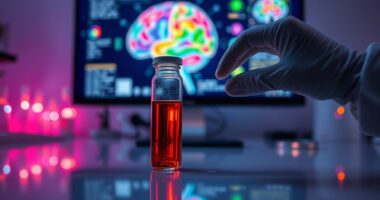Engaging in regular exercise boosts your brain by promoting neural growth, improving mood, and sharpening cognitive skills like memory and problem-solving. Physical activity increases blood flow, delivering oxygen and nutrients essential for brain health, while releasing mood-enhancing chemicals like endorphins. It also stimulates growth factors like BDNF, supporting neuron survival and new connections. If you keep exploring, you’ll discover even more ways physical activity can strengthen your brain over time.
Key Takeaways
- Exercise promotes neuroplasticity by stimulating neuron growth and strengthening neural pathways, enhancing learning and memory.
- Physical activity increases blood flow to the brain, delivering oxygen and nutrients vital for cognitive function.
- Exercise releases neurotrophic factors like BDNF, supporting neuron survival and facilitating new neural connections.
- Regular activity boosts mood and reduces stress, which positively impacts cognitive performance and mental resilience.
- Physical activity creates an adaptable brain environment, improving problem-solving skills and aiding recovery from injuries.

Regular exercise isn’t just good for your body—it also boosts your brain’s health and function. When you get moving, you activate a range of processes that enhance your mental capabilities. One of the most significant benefits is neuroplasticity, your brain’s ability to reorganize itself by forming new neural connections. Exercise stimulates the growth of new neurons and strengthens existing pathways, which means your brain becomes more adaptable and efficient over time. This neuroplasticity benefits not only your learning capacity but also your memory and problem-solving skills. As you engage in physical activity regularly, you create an environment where your brain can better respond to challenges, recover from injuries, and adapt to new information. neuroplasticity is one of the most remarkable aspects of brain adaptability, enabling lifelong learning and recovery.
Beyond enhancing neuroplasticity, exercise plays a essential role in mood regulation. Physical activity releases endorphins—your brain’s natural feel-good chemicals—helping to reduce feelings of stress, anxiety, and depression. When you work out, you often experience a sense of accomplishment and increased self-esteem, which further boosts your mental well-being. Regular exercise can help stabilize your mood, making you more resilient to emotional fluctuations. This mood regulation is critical because a balanced mental state improves your focus, decision-making, and overall cognitive performance. When your mind is calm and positive, you’re more receptive to learning new skills and retaining information.
Moreover, exercise increases blood flow to your brain, delivering oxygen and nutrients essential for best functioning. This boost in circulation supports the growth of new blood vessels and enhances overall brain health. It also encourages the release of neurotrophic factors like BDNF (brain-derived neurotrophic factor), which promotes the survival of existing neurons and encourages the growth of new ones. These biochemical effects contribute to improved cognitive abilities and long-term mental health benefits.
Frequently Asked Questions
Can Exercise Improve Memory in Older Adults?
You might wonder if exercise can boost memory as you age. The answer is yes, since exercise and aging show neuroplasticity benefits, helping your brain adapt and grow. Regular physical activity increases blood flow, promotes new neural connections, and enhances memory function. By staying active, you support your brain’s health, making it easier to remember things and stay sharp, even in later years.
How Does Aerobic Exercise Compare to Strength Training for Brain Health?
You might wonder whether aerobic exercise or strength training better boosts brain health. Aerobic exercise typically offers greater neuroplasticity benefits because it increases exercise intensity and boosts blood flow, promoting neural growth. Strength training also helps, but its benefits are more focused on physical strength. For ideal brain health, combining both types maximizes neuroplasticity benefits, encouraging your brain to adapt and stay resilient as you age.
What Types of Physical Activity Are Best for Cognitive Enhancement?
You’ll find that a mix of physical activities works best for cognitive enhancement. Incorporate mindfulness training to boost focus and reduce stress, while balance exercises improve coordination and brain connectivity. Combining aerobic workouts with strength training also supports overall brain health. Engaging in diverse activities challenges your brain, promotes neuroplasticity, and sharpens your thinking skills, making your routine more effective for cognitive benefits.
Does Exercise Help With Mental Health Conditions Like Depression?
You might wonder if exercise can truly help with mental health conditions like depression, especially when the exercise stigma persists. The answer is yes—physical activity releases mood-boosting chemicals, reducing symptoms and improving well-being. Despite mental health stigma, taking that first step can feel intimidating, but exercise offers a powerful, accessible way to support mental health. Don’t let stigma hold you back from experiencing these positive changes.
How Quickly Can Exercise Impact Brain Function?
You might notice changes in your brain function within minutes to hours of exercising. Physical activity triggers neurochemical changes, releasing endorphins and neurotransmitters that boost mood and alertness. It also promotes brain plasticity, strengthening neural connections. These effects can enhance your focus, memory, and mental clarity quickly, making exercise a powerful tool for immediate cognitive benefits. The more consistently you work out, the greater these long-term improvements become.
Conclusion
So, next time you’re tempted to skip your workout, remember—your brain’s silently begging for those endorphins. Sure, sitting on the couch feels comfy, but it’s basically doing brain push-ups—minus the gains. Exercise boosts your memory, sharpens focus, and keeps your mind young, all while you get a little sweat in. Who knew that breaking a sweat could be your brain’s best friend? So go ahead, get moving—your neurons will thank you.









